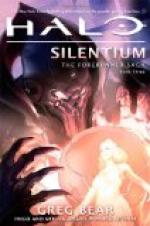“Poor old Ponty, too bad he couldn’t come,” cried Mr. Newlyn, pecking, sparrow-like, at a scrap of food on his plate. “Anything wrong, Lady Kingsmead?”
“No, I don’t think so. He telephoned just before dinner—oh!”
She broke off, and everyone turned towards the door as it opened noisily to admit a stout, red-faced man, who stood hesitating on the threshold, not as much apparently from shyness as from a kind of bodily stammer of movement.
“Ponty!”
“Awfully sorry, Tony,” explained Lord Pontefract, advancing towards his hostess, “awfully sorry, but that idiot Hendricks got a telephone message wrong, and I thought I couldn’t come. So when I found out, I thought ‘better late than never,’ though I had dined. Please say ‘better late than never.’”
“Better late than never,” chanted the whole party dissonantly, and room was made for the new-comer between Brigit and Yelverton.
“That fool Shover nearly broke my neck, too,” he confided, sitting down and lowering his voice confidentially. “I—I thought for a second I should never see you again.”
She looked at him out of the corners of her eyes. He had been drinking. No one had ever seen Oscar Pontefract drunk, but as time went on the honourable body of those who had ever seen him perfectly sober diminished rapidly.
“Haven’t seen you for ten days. Damnedest ten days I ever lived through,” he continued, helping himself to whisky and soda, “and most infernal ten nights, too. Can’t sleep for thinking of you,” he added hastily, as she at last turned and looked full at him.
She was twenty-five, and had lived in this milieu for the past seven years. It had begun by disgusting her, then for a time she had been indifferent to it, and now for the last year it had been growing steadily unbearable.
“Dites donc, Lady Brigit,” began Joyselle in her left ear, and as she listened to him she instinctively drew away from Pontefract, closer to him. At dessert Kingsmead came sauntering in, less with the air of a little boy allowed to appear with the fruit than of a gently interested gentleman come to take a look at the strange beasts it amused him to keep in a remote corner of his park.
He ate fruit in, to the unaccustomed eye, alarming quantities, and his mother’s guests discussed him exactly as if he had not been there.
A very plain little boy, Kingsmead, with stiff fair hair and many freckles. But for his mouth a most unremarkable-looking person, for his eyes, quick as those of a lizard, were pale blue in colour, and small. But his mouth turned up at the corners in a peculiar and faun-like way, and gave much character to his face, which was otherwise impassive as well as ugly.
“Boy ought to go to school,” growled Lord Pontefract.
Lady Kingsmead shrugged her shoulders. “Of course he ought,” she assented shrilly, “but what am I to do? He simply won’t go, will you, Tommy?”




